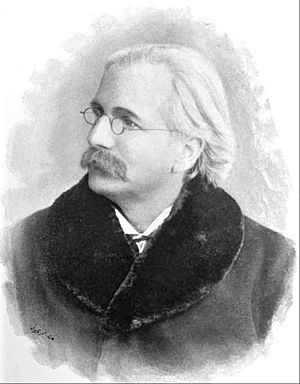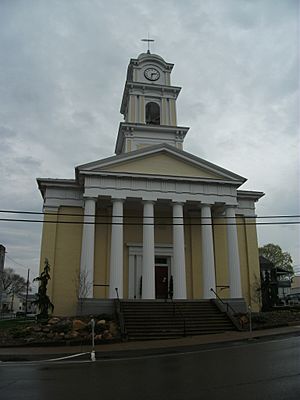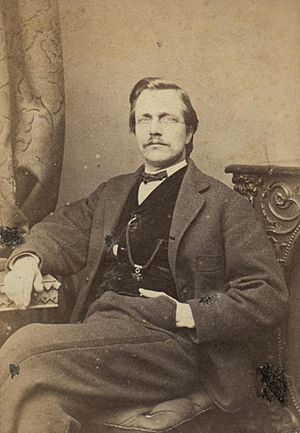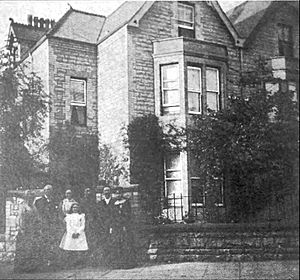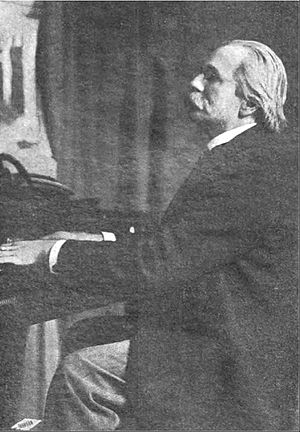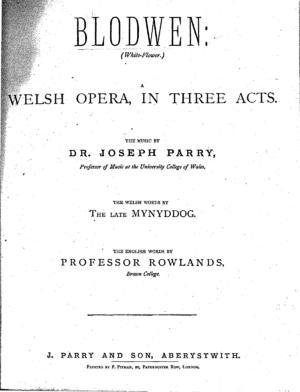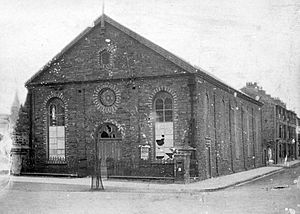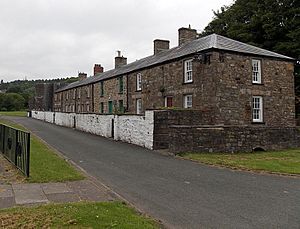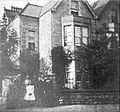Joseph Parry facts for kids
Joseph Parry (born May 21, 1841 – died February 17, 1903) was a famous Welsh composer and musician. He was born in Merthyr Tydfil, Wales. Joseph Parry is best known for writing the song "Myfanwy" and the hymn tune "Aberystwyth". The well-known African song "Nkosi Sikelel' iAfrika" is said to be based on his "Aberystwyth" tune.
Parry was also the first Welsh person to write an opera. His opera, Blodwen, was the first opera ever performed in the Welsh language.
Joseph Parry came from a large family. He left school at age nine to work in the local coal mines. Later, he worked at the Cyfarthfa Ironworks, where his father also worked. In 1854, his family moved to the United States. They settled in Danville, Pennsylvania, where Parry again found work in an iron factory.
Parry loved music, but he could not study it formally for a long time. When the ironworks closed temporarily, some of his co-workers, who were also musicians, offered music lessons. Parry joined a class to learn how to read music. He also studied music theory (harmony) with another worker. He learned to read and write words at the same time he was learning about music theory.
Soon, Parry started sending his musical pieces to Welsh music festivals called eisteddfodau. He won many awards. During a visit back to Wales, he was offered music scholarships. He could not accept them at first because his family depended on him. But people raised money to support Parry and his family while he studied music.
Parry later earned a special music degree (Doctorate in Music) from the University of Cambridge. He was the first Welshman to get both a Bachelor's and a Doctor's degree in music from that university. In 1874, he returned to Wales. He became the first Professor of Music at Aberystwyth University. Later, he took a job at Cardiff University.
Contents
Life Story of Joseph Parry
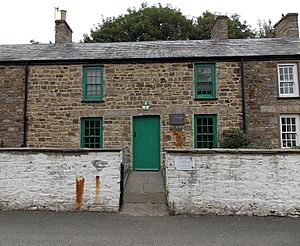
Early Years and Music Beginnings
Joseph Parry was born in Merthyr Tydfil in 1841. He was the seventh of eight children. His family loved music, and everyone sang in the church choir. Joseph's mother was known for her beautiful singing voice. Two of his sisters and one brother also became good singers in the United States.
Parry left school when he was nine years old to work in the mines. His family needed the money. He worked 56 hours a week for a very small wage. By age 12, Parry was working at the puddling furnaces in the Cyfarthfa Ironworks. His father worked there too.
In 1853, Parry's father moved to the United States. The rest of the family followed in 1854. Joseph worked at the Rough and Ready Iron Works in Danville, Pennsylvania. Danville had a large Welsh community. Parry became very involved in Welsh culture there. He attended church and Sunday school. He also played the organ at the Mahoning Presbyterian Church in Danville. That organ is still used today!
Parry did not have formal music lessons until he was 17. This happened when the ironworks where he worked closed temporarily. He became friends with three co-workers who were also musicians. They would sing during breaks. Parry joined a class to learn how to read music. He quickly became very good at it. He also wanted to learn about music theory, called harmony. One of his co-workers taught him. Joseph could not read or write words when he started these lessons. His teacher patiently taught him reading along with harmony. Parry learned very quickly. During this time, he also learned to play the harmonium.
Returning to Wales for Music
In 1861, Parry entered a music competition (eisteddfod) in Utica. He won first prize for his piece called Temperance Vocal March. He wondered how his music would be received in Wales. So, in 1864, he sent an anthem to the National Eisteddfod of Wales in Llandudno. The judges thought he was a professional musician and gave him first prize.
In 1865, Parry traveled to the eisteddfod in Aberystwyth. His entry was lost in the mail, so it could not be judged. Instead, he was given a special honor and the title "Pencerdd America" ("Chief Musician of America").
During this visit, Parry and his friends gave concerts of his music across Wales. People loved his work. He was offered a chance to study music for a year in Swansea, then a scholarship at the Royal Academy of Music. But he had to say no. He had a wife and child in the United States who depended on him. By 1865, Parry's musical talent was well known. People in both Wales and the US started a fund to support him and his family while he studied music. Parry also helped by giving concerts in Pennsylvania, New York, and Ohio.
In 1868, Parry and his family moved to England. He studied at the Royal Academy of Music for three years. During his last year, he performed for Queen Victoria three times. Each time, she asked him to play only music he had composed himself. In 1871, Parry decided to study for a music degree at University of Cambridge. He became the first Welshman to earn both a Bachelor's and a Doctor's degree in music from Cambridge.
After getting his bachelor's degree, Parry and his family went back to Danville. He ran a music school there for three years. When Aberystwyth University created a music professor job, they offered it to Parry. He moved his family back to Wales and became the university's first Professor of Music.
Professor and Doctor of Music
Parry worked at Aberystwyth University from 1874 to 1881. Besides teaching, he often traveled to judge music competitions and conduct concerts of his own pieces. He received his Doctorate from Cambridge in 1878. For this degree, he had to write a short oratorio (a large musical work for voices and orchestra) and have it performed. Usually, a college choir would perform it. But Parry brought 100 Welsh singers to Cambridge to perform his oratorio. In 1880, Parry left Aberystwyth University and opened his own music academy in the town.
In 1881, the Parry family moved to Swansea. Parry became the organist at Ebenezer Chapel and started another music college. In 1888, he was offered a job at Cardiff University. So, Parry and his family moved to Penarth, a nearby town. He taught at the university and was known as "Y Doctor Mawr" ("The Great Doctor"). Parry also became the organist at Christ Church Congregational Church in Penarth.
Parry was considered for the principal job at the Guildhall School of Music and Drama in 1896. Many people, including city officials and his former teachers, wrote letters supporting him. There were 38 applicants for the job. Parry was not chosen, but he continued his work at the university. He also kept judging eisteddfodau, conducting large singing festivals (Cymanfaoedd Canu), and performing and lecturing in Wales and the United States until he died.
Family Life and Character
In 1861, Joseph Parry married Jane Thomas (1844–1918) in Danville, Pennsylvania. She was the daughter of Welsh immigrants. Her brother, Gomer Thomas, published many of Parry's early songs. Joseph and Jane had three sons and two daughters. Their older children were born in Danville. Only their youngest child was born in Wales.
Two of Parry's sons died after the family moved to Penarth. His youngest son, William, died in 1892. His oldest son, Joseph Haydn, died two years later. All of Parry's children had musical talent. His eldest son, Joseph Haydn, even became a composer and teacher like his father.
In 1894, Parry and his wife hoped a trip to the US would help them feel better after losing their two sons. Parry had last visited the United States in 1880 for a concert tour. He felt he should be available to the public during his visit. Many people in the US had helped him financially when he was studying music in England.
Parry asked a friend to tell the Welsh community in the US that he would visit. He offered to judge eisteddfodau, give talks, or lead singing festivals. Parry and his family visited many cities in the eastern US and were welcomed warmly. He wrote letters to The Western Mail newspaper, telling people in Cardiff about his travels. Parry's last trip to the United States was in 1898. He visited Salt Lake City and judged the eisteddfod there. His last major work, an opera called The Maid of Cefn Ydfa, was first performed in Cardiff in late 1902.
Parry was known as a religious man and a very hard worker. Even though he was famous, he was not rich. He was not good at business. So, a group of his friends managed his business affairs. Parry would compose music, and his friends would handle publishing it. Many of his friends thought he should have lived in London. They believed he would find more inspiration there, as his music was mostly about Welsh subjects. In 1859, Parry and his family became US citizens. He was proud to be both Welsh and an American citizen.
David Jenkins, who was Parry's student and assistant, said Parry was very enthusiastic about music. Sir Alexander Mackenzie, who also worked with Parry, agreed that he had great musical ability.
Joseph Parry's Death
About two weeks before he died, Parry became very ill. He needed surgery. A second operation was needed later due to problems. Parry got a high fever from blood poisoning a few days after the second surgery. He got a little better for a short time but then became weaker. Parry had planned a tour of Australia and the US for 1904. He was sick in bed when three opera companies agreed to perform his opera The Maid of Cefn Ydfa. He never got to hear this good news. Joseph Parry died at his home in Penarth on February 17, 1903. His very last song was written during his illness. It was a tribute to his wife, Jane, called Dear Wife.
At least 7,000 people came from all over the country for Joseph Parry's funeral in Penarth. They lined the streets from his home to Christ Church, where his family worshipped. He was buried in the churchyard at St Augustine's. His family and friends were joined by officials from Cardiff, university staff and students, and many choir members from Wales. Ministers from different churches also came to pay their respects. Parry's monument is a marble column with a lyre (a harp-like instrument) on top. The lyre has seven strings, representing his family members. Two of the strings are broken, showing the deaths of his two sons who died before him.
Soon after his death, a national fund was started in Parry's name. This money was meant to support his widow, Jane, with yearly payments. Any money left after Jane's death would be used for a national music scholarship named after Parry.
Joseph Parry's Music
Joseph Parry wrote a lot of music. One of his early songs, "My Childhood Dreams," was published while he lived in Danville. Even though he loved composing, most of his big works were not very successful financially. His oratorio, Saul of Tarsus, was written for the National Eisteddfod at Rhyl in 1892. It was somewhat successful. Parry and others thought it was his best work. But it was hard to perform, and the music score was very long (305 pages).
Parry is believed to have written 27 complete works. These include ten operas, five cantatas (musical pieces for voices), and two oratorios. He also wrote countless songs and hymns. By the 1890s, Parry was well known. Many people asked him to write music for them. He worked with different publishers for some of his pieces. He also published some himself, like his opera Blodwen. He seemed to publish less himself in the 1890s. This might be because he lost his printing plates in a fire in 1893.
Many of Parry's works were never published during his lifetime. His study shelves were full of handwritten music. A friend once told him he needed a safe to store his manuscripts in case of fire. When Parry said he could not afford one, his friend gave him one as a gift. More than 100 years after his death, one of his unknown works, Te Deum, was found by accident in the National Library of Wales archives.
After Parry died, the Welsh Congregational Church wanted to buy the rights to all his works and publish them. They successfully got the rights to "Aberystwyth" and over 60 other hymns and anthems. In 1916, Parry's widow, Jane, sold the rights to all the works Parry owned to a music publisher for £1150.
Aberystwyth Hymn Tune
The music for "Aberystwyth," written by Parry, was first published in 1879. It appeared in a book called Ail Lyfr Tonau ac Emynau (meaning Second Book of Tunes and Hymns). It was paired with words by Charles Wesley, "Jesus, Lover of My Soul." It was first sung at the English Congregational Church in Portland Street in Aberystwyth, where Parry was an organist.
Enoch Sontonga worked at a Methodist mission school near Johannesburg. Like Parry, Sontonga was a choirmaster. In 1897, he wrote new words to Parry's music. He called the hymn Nkosi Sikelel' iAfrika. Welsh missionaries often brought hymn books to their missions in Africa. It is thought that Parry's hymn reached Africa this way. Sontonga wrote only one verse and a chorus for the song. But Samuel Mqhayi wrote seven more verses in 1927. This song became the national anthem of South Africa and four other African countries.
Blodwen Opera
Parry's opera, Blodwen, was first performed in Aberystwyth's Temperance Hall on May 21, 1878. However, Parry did not publish it until 1888, when he was in Swansea. This was the first opera written by a Welsh composer. It was also the first opera performed in the Welsh language. The story of the opera, written by Richard Davies, takes place during the Welsh Revolt. This was the last time the Welsh tried to keep their independence.
At that time, very few people in Wales had seen an opera. They did not know what it was like. The opera programs explained things. For example, they said the singers would wear costumes but would not be "acting." People who belonged to Welsh nonconformist churches needed to be sure this was not a theatrical performance. Acting and theaters were often seen as bad, like taverns. Parry grew up in a nonconformist church and followed his faith his whole life. Most of the people in the first Blodwen performance were Parry's music students. His two older sons also played piano and harmonium. Before the show, Parry spoke to the audience. He repeated what was in the programs: that the performers were not acting. He explained what an opera was. Even so, some church leaders were still not happy.
Soon after Blodwen was first performed, a local couple named their baby daughter after the opera's main character. Before this, no children were recorded as being named Blodwen. Records show the name became very popular for girls. The hero's name, Howell, also became popular for boys. The opera was a success. By 1896, it had been performed over 500 times around the world. Even though "Aberystwyth" and "Myfanwy" were popular, Blodwen seemed to be Parry's most popular work during his lifetime.
Myfanwy Song
While Joseph Parry is often thought of as the only creator of this famous song, it was actually a team effort. A poet and journalist named Thomas Walter Price published a poem in English called Arabella. It is believed that Parry wrote the music before the Welsh words for Myfanwy were written by Richard Davies. Parry's music was published in 1875. Parry sold all the rights to the song to a publisher for £12. The song was first performed at a concert in Aberystwyth on May 28, 1875, with Parry conducting. It is still a very popular song for Welsh male choirs today.
Te Deum Discovery
Edward-Rhys Harry put together Parry's music for the Te Deum. This was found in the National Library of Wales archives. Parry wrote this music in 1863, while he was living in Danville. Harry found the handwritten music while studying choral traditions at the library. He spent a year copying the original manuscript. The London Welsh Chorale performed it for the first time ever on July 14, 2012, in London.
Other Works and Writings
Parry was also involved in publishing music. Starting in 1861, he regularly wrote about Tonic sol-fa (a way to teach music reading) for a Welsh music magazine. Parry's work helped everyone interested in singing in choirs to participate. He edited Cambrian Minstrelsie (a collection of Welsh songs) in 1893. He also put together Dr Parry's Book of Songs, which was a collection of his own works. In 1888, he wrote Elfenau Cerddoriaeth ("Elements of Music"), a Welsh book about music theory.
After moving to Penarth, Parry also became a journalist. He wrote regular columns for The Cardiff Times and The South Wales Weekly News. He also wrote for The Western Mail. In his later years, Parry wrote his life story (autobiography). He never published it. The National Library of Wales got this manuscript in 1935 from Edna Parry Waite, Parry's daughter. The National Library published Parry's writings as a bilingual book, The Little Hero-the Autobiography of Joseph Parry, in 2004.
Parry also wrote what might be the first original piece for a brass band by a well-known composer. It was called 'Tydfil Overture' (around 1874-1880).
Joseph Parry's Legacy
Impact in Britain
In 1947, another writer from Merthyr Tydfil, Jack Jones, wrote a novel called Off to Philadelphia in the Morning. This book was based on Joseph Parry's life. The book was made into a three-part TV show by the BBC in 1978. Jack Jones always said his book was fiction, but some parts of it have been mistaken for facts.
The 100th anniversary of Parry's death was celebrated with an outdoor concert in Merthyr Tydfil's Cyfarthfa Park. Parry's music was performed. The concert was filmed in 2002 and shown on Welsh television in 2003. One of Parry's great-granddaughters, who was an opera singer, attended the event.
An anthem Parry composed with Rev. Robert David Thomas while in Pennsylvania was performed for the first time in Wales to mark the anniversary of his death. There was no record of the anthem, "Cymry Glan Americ," ever being performed in Wales before. A relative of Rev. Thomas found the music. A band performed it in 2002.
In 2011, conductor Edward-Rhys Harry put together Parry's oratorio Emmanuel again. It was performed in December of that year. In May 2013, Emmanuel was performed in the US for the first time in New York and Philadelphia.
Parry's Childhood Home
The small house at 4 Chapel Row, Merthyr Tydfil, where Parry was born, is now a museum open to the public. These cottages were next to the Bethesda Chapel, where the family went to church. The house has two bedrooms upstairs and a kitchen and another bedroom downstairs. The Parry family lived here with two renters until they moved to the United States in 1854.
The chapel and its cottages were planned to be torn down in 1977. But efforts by the local council and students saved the cottages, though not the chapel. In 1979, the Merthyr Tydfil Heritage Trust opened the cottage as a museum. Exhibitions were added upstairs in 1986, and the ground floor was restored in 1990. Parry's home was updated in 2016 and reopened on what would have been his 175th birthday. The home is now part of the Cyfarthfa Heritage Area.
Impact in the United States
Parry is fondly remembered, especially at the Mahoning Presbyterian Church in Danville. He served as organist and choirmaster there. Each time he visited the US, Parry returned to play the organ at the church. The Susquehanna Valley Welsh Society holds a yearly singing festival (Cymanfa Canu) in his honor at the church. It is held on the Sunday closest to his May 21 birthday. In 2007, the church's steeple was restored with help from the National Welsh American Foundation. The church was rededicated on May 21, Parry's birthday. A plaque has been placed at one of his homes in Danville. The community also celebrated the 100th anniversary of his death with a concert of his works at the local Danville Festival.
List of Joseph Parry's Works
Operas
- Blodwen (1878)
- Virginia (1883)
- Arianwen (1890)
- Sylvia (1895)
- King Arthur (1897)
- Cap and Gown (1898)
- Ceridwen (1900)
- His Worship the Mayor (1900)
- The Maid of Cefn Ydfa (1902)
- Y Ferch o'r Scer (1902)
Choral Works
- Y mab Afradlon (The Prodigal Son) (1866)
- Yr Adar (1873)
- Jerusalem (1878)
- Emmanuel (1880)
- Joseph (1881)
- Nebuchadnezzar (1884)
- Saul of Tarsus (1892)
- Cambria (1896)
- Many Hymns and Anthems
Other Music
- String Quartet
- Ballade, for Orchestra
- 4 Sonatas for Solo Harp
- Many songs, published alone or in collections
Images for kids
-
4 Chapel Row, Merthyr Tydfil, Parry's birthplace
See also
 In Spanish: Joseph Parry para niños
In Spanish: Joseph Parry para niños
 | Aaron Henry |
 | T. R. M. Howard |
 | Jesse Jackson |


